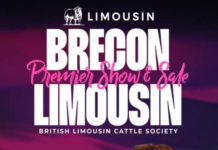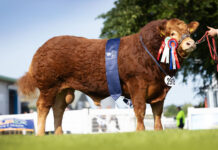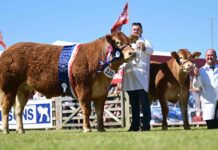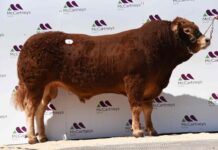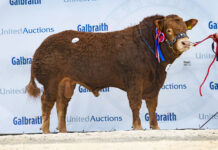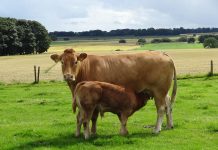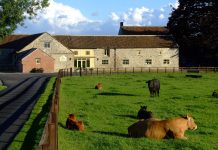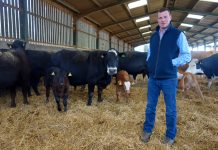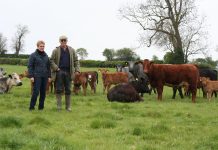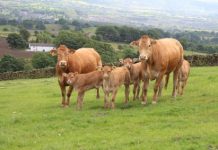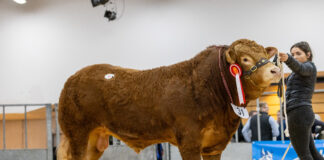Starting a major farming enterprise from scratch is a challenging business. Even more so when you and the family are leaving home and setting up in a new country.
 But 33 years ago, that’s just what William and Anne Jamison did and have built up their enterprise on firm Limousin foundations. Despite hard work and hard times, they don’t regret it one bit. It was William’s aunt and uncle who bought the farm as a home and business for the whole family, including Anne, William, and his sister. Together, they made the move and the life-changing experience of moving lock, stock and barrel from Northern Ireland to Devon in the south west of England.
But 33 years ago, that’s just what William and Anne Jamison did and have built up their enterprise on firm Limousin foundations. Despite hard work and hard times, they don’t regret it one bit. It was William’s aunt and uncle who bought the farm as a home and business for the whole family, including Anne, William, and his sister. Together, they made the move and the life-changing experience of moving lock, stock and barrel from Northern Ireland to Devon in the south west of England.
Driven by the high price of good farmland in CountyDown and the relatively low prices in Devon back in 1979, they set about the task of transforming 193 acres of then arable land on the western edge of Dartmoor into an efficient cattle unit, which today is predominantly Limousin-based. Wortham Farm, Liston sits just one mile in fact from the Cornish border.
They were also keen to have their land in a single block, to avoid renting at that time and to keep off the roads in their day-to-day farming operations and William’s primary aim was to be in livestock. That was his father’s way.
“My father was into stock. He liked his cows and that’s what I wanted to do.”
They started with the basics – a cow and three calves. Now they have 350 cows and keep around 600 calves for fattening. The main herd is of Limousin-cross Friesians, with a number of Herefords, Charolais, Belgian Blues and South Devons running with seven Limousin bulls, five Blues, one Charolais and one Angus.
Building the herd and the business to its current well-respected status has not been easy. The farm they bought had been run as an arable enterprise.
“It was all under the plough; there’s wasn’t a blade of grass here,” said William.
All fences and gates had to be replaced and the land re-seeded.
They have also had to invest heavily in laying two and a half miles of pipe to bring in mains water and in erecting new buildings for the cattle. It has been a time-consuming and expensive effort.
Some 30 acres have been kept back as arable land, this year producing oats and winter barley, all for on-farm consumption. Today, the farm includes a further 130 acres that they own and with land they rent, the total acreage stands at 360.
As the herd grew in the early years, said William, “We bought in young calves and reared them on the bucket … we kept some of the heifers back as cows and built up that way.” Holsworthy market was the main place of business and at that time they were concentrating on Friesian-crosses.
Today the main focus is on Limousin, with the bulls being put to both the Limousin and the Blue cows.
“We aim to get double muscled calves; take them on through the fat or sell to the store market. A good animal costs less to get to fat than one which isn’t so good.”
Limousin is preferred because of the easier calving they enjoy and … “because Limousin is easier all round – for the cow, for the calf, which doesn’t get stretched or injured, and for me!” said Anne. “And you get them sucking quick.”
There is no intention on this farm to establish a pedigree herd, although the quality of the animals they produce is increasingly widely appreciated and all the bulls they buy are themselves pedigrees. “We’ll always get the very best we can afford to buy,” said William.
James Neale is a partner, with his father and mother, in the Launceston-based JH Neale & Son, which runs the Nealford pedigree Limousin herd, which provides bulls to William and family.
James welcomes the Jamison family business:
“He’s a very, very good stockman and likes to buy the best. He’s come buying bulls for the past four years. He wants easy calving and the first things he looks for are plenty of length and muscle. That’s a good combination.”
When it comes to selling on their store cattle, James has been in the queue for the Jamison product – particularly the red Limousin. “We would buy a few off him – steers or heifers for selling on. We try to buy back because we know the breeder behind them.”

The Neales are currently enjoying success in showing one of their young bulls, Nealford General, born in March 2011 who has won a barnful of top awards at the DevonCounty, Royal Cornwall and other local shows, including Holsworthy and Okehampton. He will be heading to his new home on the Jamison farm to start work in the spring.
“William picked him out as a 13-month-old bull. We came to an agreement that we would show him, which we have done and we have had a lot of fun,” said James.
When the Jamisons sell their cattle today, it is done mainly through Sedgemoor Livestock Market. They were in the habit of taking a load of cattle every couple of weeks and although it’s a bit of a journey, they were rewarded with higher prices than they might achieve at more local venues.
It was there that the Exeter-based farm manager for FWS Carter & Sons Ltd, Andrew MacLeod, saw their store cattle and bought the lot. Then he visited the Jamison farm, liked what he saw and once again bought all that was on offer.
“We are a breeding and finishing unit, dealing at the top end of the quality market and therefore looking for good conformation and a well-grown animal. We try to buy off-farm as much as possible, looking for weaned calves up to ten months old,” he said.
Buying off-farm has clear financial advantages for both parties and a deal was struck, giving Carters the opportunity to buy the farm’s entire output of store cattle.
All was going well until TB struck 12 months ago. Operations had to close down and it has been a very tough financial time for the family. But with one clear test result in the bag, they are now hoping the next one is clear and they can get back to business as usual.
At present therefore they are fattening their own cattle on an ad-lib blend of barley, sugar beet and molasses, with straw available as an alternative. Their home-grown produce is added to the bought-in blend. Cows also have a silage element to their feeding regime.
It’s an expensive time but there is a brighter future to look forward to. Andrew MacLeod confirmed:
“Once they are freed of the restrictions and back in production, we will be buying from them again.”
This is a family-run farm in every sense with William and Anne’s two daughters very much part of the team. Kate is mainly concerned with looking after the new-born calves and Sarah also keeps rare breed British Saddleback and Gloucester Old Spot pigs, which she sells locally once fattened. Her partner, Heiko, also works on the farm. The couple met when Sarah was working on a dairy farm in Estonia and has proved so hard working and versatile that he is now an essential part of the team.
Although frustrated at their current predicament, William is nevertheless optimistic about the future of this Limousin-based suckler enterprise:
“I have a good wife, two great girls and they have good partners. We have had hard times but life is what you make it and if you have good friends and neighbours you’ll get through. That’s what we do.”


